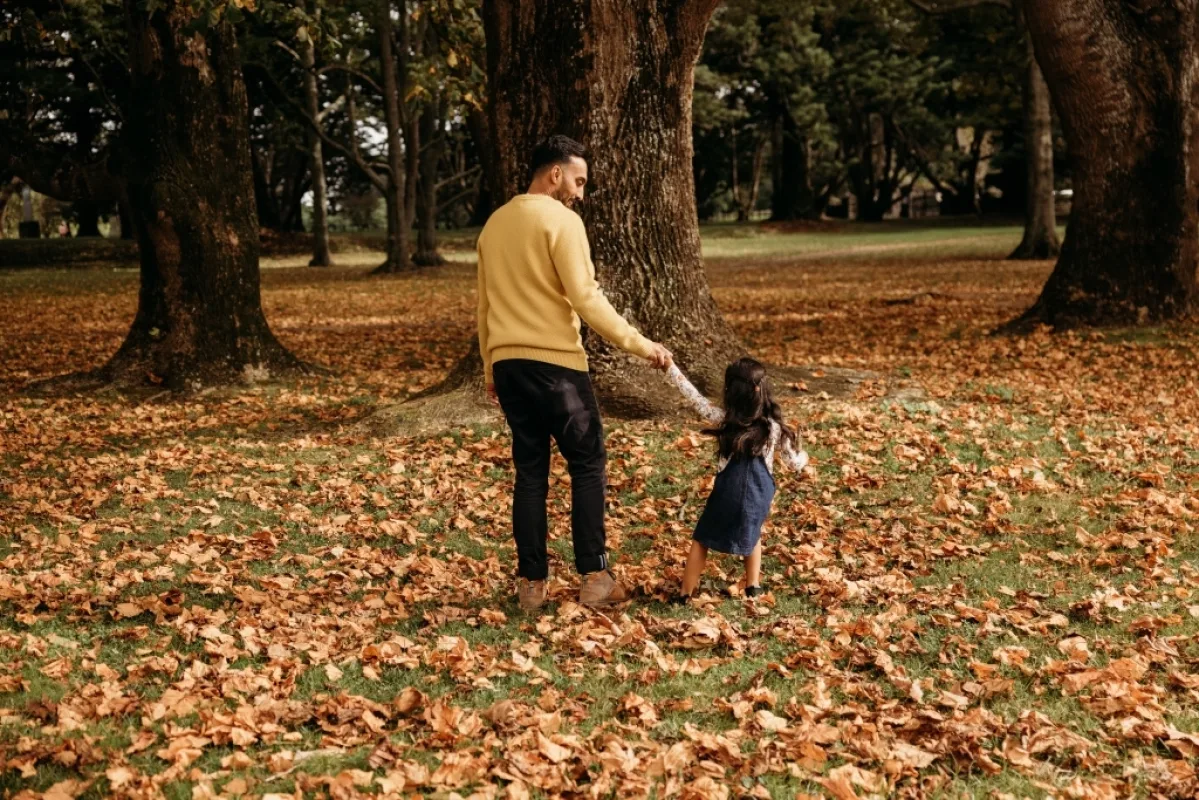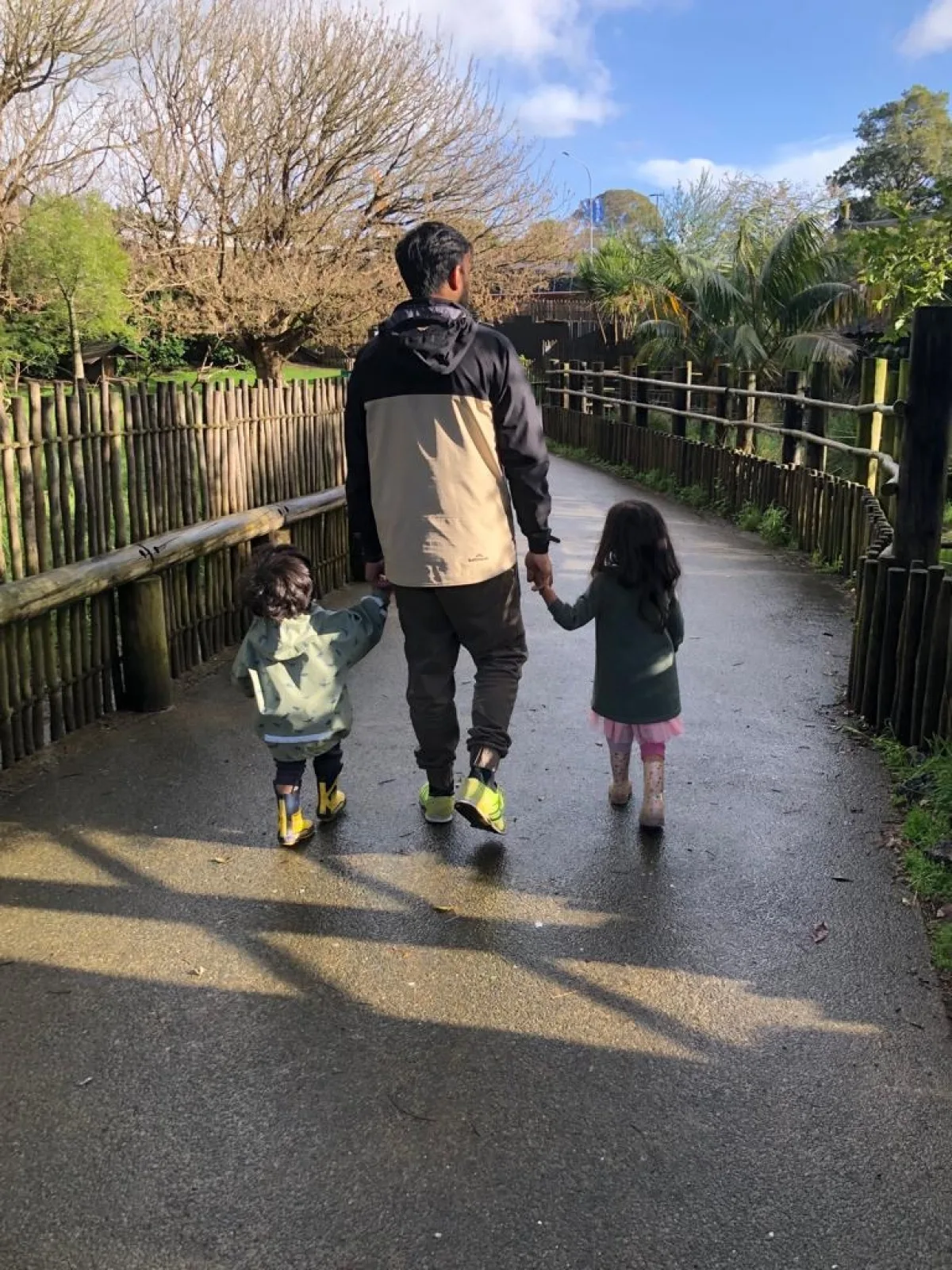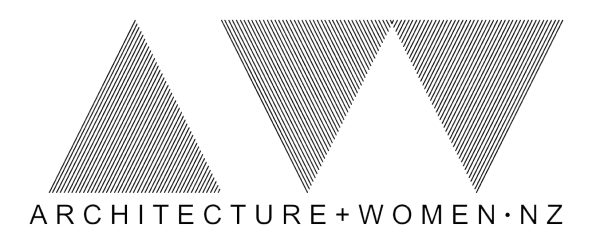Care | Work Series - #3 Rajan Hira
23 Apr 2024We welcome Rajan Hira, principal at Chow:Hill Architects, to our Care|Work Series. Raj has been a long time friend of A+W NZ having previously participated in both Fathers' Forums in 2019 and 2022. Raj generously shares advice and insight into how he and his wife, Teesha, balance being architects and parents together.

Introduce yourself! What is your current role, and your responsibilities at work and at home?
My name is Rajan - everyone calls me Raj - and I'm a principal at Chow:Hill Architects. I am a Principal, registered architect, and the team leader for our general architecture team in Auckland.
In terms of the arrangement at home, my wife Teesha and I are both architects. We both work four days a week, 80% hours for 80% pay. We both take Wednesdays off, and we each do two pickups and two drop-offs for the kids every week.
What does a typical working day look like for you?
On the days when I drop the kids off, I'll drop them off around 7:30am, and I'll usually be on the train around 8am. On those days, I'll usually stay in the office until about 4pm.
When I'm picking the kids up, I'll usually start working a lot earlier, so I’m on the train from about 6am. I leave the office at probably more like 2pm, and then pick up the kids around 3:30pm.
I can also work while I’m on the train, so every morning and evening I work for 45-50 minutes during my commute. And on any of those four days, if I have to do an extra half an hour in the evening, I can do that. But I try my best to protect my Wednesdays from work, as much as I can.
When you became a parent, how much time off did you take, and when you returned to work, were you part time or full time?
Up front I took just two weeks off from work, because my mother-in-law stayed with us for six weeks, which is quite traditional in Indian culture. It was incredibly helpful because we always had food, she helped with the cleaning and was always there to help with the baby. Then when our daughter was six months old, I went on six months of paternity leave while Teesha went back to work full-time.
When I was at home with our daughter for those six months I saw how quickly she was changing. The closer I got to going back to work, we realised that if I went back full-time, I would just not see her during the day for 5 days a week. When they're little their awake hours during the day are quite short. And I just didn’t want to miss out. So, Teesha and I decided to both go to the four day, 80% hours 80% pay arrangement instead.
I was at home with our daughter when the first Covid-19 lockdown happened, which meant that Teesha got to see a lot of what was going on while she was working from home. With our second one, Teesha was home the first full year, and it also happened the other way around, where during lockdown I was able to see our son during the day while I worked from home.
We found the second six months with the kids were the most interesting and most engaging, because they went from being cute little potatoes to being people who sit, and move, and look, smile and laugh. So being able to be there for those ages was really quite cool.

When I talk about my experience, more often than not people are really supportive, and they say things like “I wish I did the same thing”. I think that gives you a hint that maybe there’s a desire there for more fathers to have a similar working arrangement.
Did your career goals and aspirations change after becoming a parent?
Our aspirations didn’t alter, but the timeline adjusted. Mostly because we started thinking carefully about how we could both progress at the same kind of rate.
We have strategies that allow us to attend or participate in a range of activities – including staff functions, training or CPD events, and arranging meetings to connect with new clients, consultants and contractors.
For example, if she has something coming up where she needs to stay at work later, we try to manage daycare pickups around that. The only real impact that's had is that we try not to schedule any meetings after two o'clock if we can, so we are both kind of flexible for that period at the end of the day.
Did your workplace support your choice to have a family and your return to work? If so, how?
Yes. They have been really supportive. It helped that we have so many women in leadership, and that some of our male leaders have taken time off too. This meant that the culture was already there. It just made it such an easy conversation. I think they saw value in what I was bringing to the company in terms of my skills and attitude, and I saw value in terms of the company's ethos and the natural alignment with my career aspirations. You could say that it is like a happy arranged marriage.
When I talk about my experience, more often than not people are really supportive, and they say things like “I wish I did the same thing”. I think that gives you a hint that maybe there’s a desire there for more fathers to have a similar working arrangement. It’s just really important to understand all of the different fishhooks, things like the differences in earning potential (between the two people in a relationship), pressures with your week-to-week costs, buying a home, where you live in the city… all those things will have an impact.
What sort of support structure do you have?
We're really lucky. Most of my extended family lives in West Auckland, and they've been really active. My folks are around all the time, and then my wife’s folks will come up from Taranaki quite frequently, and they’ll be with us for a week or two weeks at a time. We’ve both got siblings and best friends who are in Auckland, many of whom aren’t far away from where we live. That whole network makes such a difference.
A lot of support I get is from my school friends circle. We play football together, and many of the guys have now got kids as well. And the cool dynamic that we have is that all the dads love being dads. So, we go to football matches and we’ll sit down afterwards and have a beer and we'll talk about what it’s like to be a dad. Just normalising everything that’s going on. Yeah, sleep training sucks, but it's really awesome to get through it. Having to go to hospital sucks, or you know, the first few days of daycare you're all gonna cry. It is strange, wonderful and normal all at the same time.
What challenges have you faced as a working parent? Do you feel having children has impacted on your career progression?
I don't think so. I read a book called Stolen Focus by Johann Hari a little while ago, and it discusses the concept of ‘fixed scheduled productivity’. Which in laypersons terms means that if you only have so much time to do work, you find ways to get it done – be it through being more efficient, fixing that bug in your software, getting better at delegation or even learning how to say no. In my observation it happens a lot with working mums in particular, who can't work after hours and can't work weekends. They come in and they are just so switched on and so focused. I only have so much time, and therefore I just have to make the most of it, and so I am getting the most of my four days a week.
In terms of the challenges, I was 35 when we had our first child, and so I had a bit more autonomy. I could plan meetings around my kids or if I said to a client, can we shift the meeting out, they usually would be okay with that. But I acknowledge that if I didn't have that seniority, then that would be impossible, because then you’re at the whims of whatever else is going on.

for men in particular, understanding that the dynamics for women are different (typically more difficult), and not being dismissive of that...there are different obstacles that we all face.
It’s about trying to lift people up with you, and trying to give them the opportunities that you had, maybe with fewer obstacles, because we all benefit from that in the end.
If you had to change one thing in the workplace for working parents, what would be?
Teesha and I both front-footed the whole conversation with our respective employers. I sat down with our CEO and one or two of the directors and said, look, this is my plan. We want to have two kids, we want to try and do it in this rough period of time etc. From that point, they had a feel for what we were thinking / planning and they could work through it with us. There was this sense of relief for me. And that was the same feedback that Teesha got from her then associate director and current director.
Legally employers can't ask and people don't tend to want to talk about this stuff as it can be incredibly personal and sensitive. But I think we've got to find a way to do this better. If you could provide an environment where people could share their family plans, it removes the element of surprise, reduces stress in what can already be a stressful situation, gets people talking about it more and not being afraid of it. It also allows people to be more human, particularly if you have a difficult scenario.
What is your opinion of having it all as a working parent? Do you feel pressure or guilt from people's expectations?
None whatsoever. But if you ask my wife, it’s the opposite. I can do the crappiest job as a parent, and people are like, “Oh my goodness, a dad doing this, that’s amazing”. You know, I could literally walk into the supermarket with kids covered in poo. And they'd be like, “He's doing such a good job, look at him caring for his kids”. And if my wife walked into the supermarket with a single hair out of place on one of the kids, or mismatching socks or something, there’s this judginess. It is an awful, duplicitous situation. So personally, there are no issues for me in that area. But I have to keep talking to my wife to make sure that we're getting both sides of the coin, because it is unfair.
Has being a parent affected the way you approach architectural practice?
Yes, absolutely. I’ve become more people focused, because I’m recognising that the smallest change in your own individual environment has such a huge impact on what you project out into the world. And so, just watching people closely to see how they're responding to things - how are they behaving, how are they feeling, what is their body language showing, what words are they using today? It is often a reflection of what's going on behind the scenes, and not at all what's going on around here in the office.
So being more aware of that, and trying to be more empathetic. When something isn’t going to plan, for example, I start by reminding myself that I am looking at someone who's rational and well intentioned and trying their best, and it is just that this one thing isn’t working right now. If you start from that point, you're not going to jump to conclusions like ‘so-and-so is useless’. Instead, you try to and lift them up, you go and talk to them about their process, or give them a better steer as to what they can be doing, or where to find support. Just all that people-centric stuff. And often you discover that you are part of the problem (and part of the solution) too.
Do you have any other thoughts or advice or experiences to share?
Try to be as open and transparent about all these things as you can. Acknowledging that that can be difficult, because some people have difficulty having children – miscarriages are more common that we all think. It’s not easy. And then there’s the health problems that can come with kids when they’re young, because they are quite delicate and precious. But I find that people are generally more understanding about everything if you just give them a little bit of knowledge and information. I think that transparency is going to help people more.
And for men in particular, understanding that the dynamics for women are different (typically more difficult), and not being dismissive of that. Recognising that actually there are different lenses of the world, so you’ve got to try to understand that other perspective, which is really hard. It’s not about saying that you haven’t worked hard, or anything like that. It’s just that there are different obstacles that we all face. It’s about trying to lift people up with you, and trying to give them the opportunities that you had, maybe with fewer obstacles, because we all benefit from that in the end.
Interview by Lisa McClintock
Edited by Lisa McClintock
The A+W NZ Care | Work Series collects a diverse range of stories portraying the challenges of balancing career and family. Through sharing experiences and guidance, A+W NZ aims to provide support to those working whilst caring for family and/or others in their community and stimulate wider conversations in the industry.












